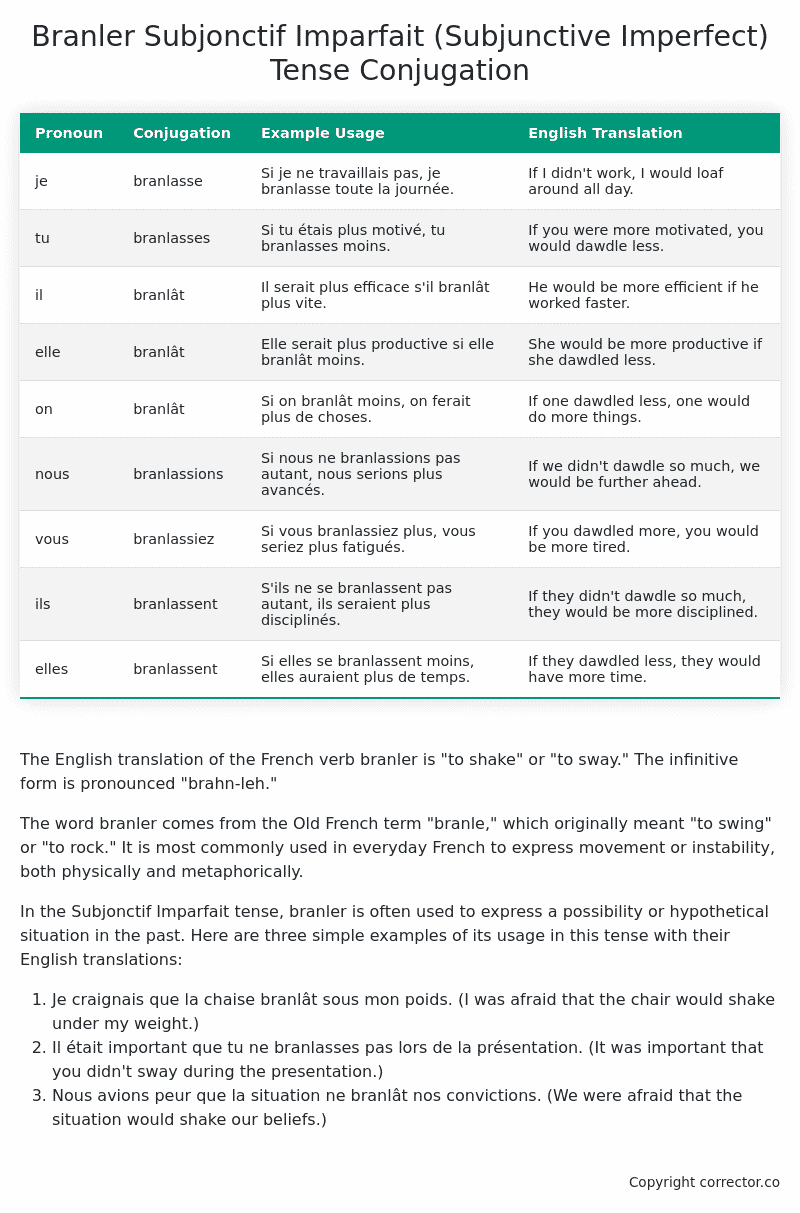Subjonctif Imparfait (Subjunctive Imperfect) Tense Conjugation of the French Verb branler
Introduction to the verb branler
The English translation of the French verb branler is “to shake” or “to sway.” The infinitive form is pronounced “brahn-leh.”
The word branler comes from the Old French term “branle,” which originally meant “to swing” or “to rock.” It is most commonly used in everyday French to express movement or instability, both physically and metaphorically.
In the Subjonctif Imparfait tense, branler is often used to express a possibility or hypothetical situation in the past. Here are three simple examples of its usage in this tense with their English translations:
- Je craignais que la chaise branlât sous mon poids. (I was afraid that the chair would shake under my weight.)
- Il était important que tu ne branlasses pas lors de la présentation. (It was important that you didn’t sway during the presentation.)
- Nous avions peur que la situation ne branlât nos convictions. (We were afraid that the situation would shake our beliefs.)
Table of the Subjonctif Imparfait (Subjunctive Imperfect) Tense Conjugation of branler
| Pronoun | Conjugation | Example Usage | English Translation |
|---|---|---|---|
| je | branlasse | Si je ne travaillais pas, je branlasse toute la journée. | If I didn’t work, I would loaf around all day. |
| tu | branlasses | Si tu étais plus motivé, tu branlasses moins. | If you were more motivated, you would dawdle less. |
| il | branlât | Il serait plus efficace s’il branlât plus vite. | He would be more efficient if he worked faster. |
| elle | branlât | Elle serait plus productive si elle branlât moins. | She would be more productive if she dawdled less. |
| on | branlât | Si on branlât moins, on ferait plus de choses. | If one dawdled less, one would do more things. |
| nous | branlassions | Si nous ne branlassions pas autant, nous serions plus avancés. | If we didn’t dawdle so much, we would be further ahead. |
| vous | branlassiez | Si vous branlassiez plus, vous seriez plus fatigués. | If you dawdled more, you would be more tired. |
| ils | branlassent | S’ils ne se branlassent pas autant, ils seraient plus disciplinés. | If they didn’t dawdle so much, they would be more disciplined. |
| elles | branlassent | Si elles se branlassent moins, elles auraient plus de temps. | If they dawdled less, they would have more time. |
Other Conjugations for Branler.
Le Present (Present Tense) Conjugation of the French Verb branler
Imparfait (Imperfect) Tense Conjugation of the French Verb branler
Passé Simple (Simple Past) Tense Conjugation of the French Verb branler
Passé Composé (Present Perfect) Tense Conjugation of the French Verb branler
Futur Simple (Simple Future) Tense Conjugation of the French Verb branler
Futur Proche (Near Future) Tense Conjugation of the French Verb branler
Plus-que-parfait (Pluperfect) Tense Conjugation of the French Verb branler
Passé Antérieur (Past Anterior) Tense Conjugation of the French Verb branler
Futur Antérieur (Future Anterior) Tense Conjugation of the French Verb branler
Subjonctif Présent (Subjunctive Present) Tense Conjugation of the French Verb branler
Subjonctif Passé (Subjunctive Past) Tense Conjugation of the French Verb branler
Subjonctif Imparfait (Subjunctive Imperfect) Tense Conjugation of the French Verb branler (this article)
Subjonctif Plus-que-parfait (Subjunctive Pluperfect) Tense Conjugation of the French Verb branler
Conditionnel Présent (Conditional Present) Tense Conjugation of the French Verb branler
Conditionnel Passé (Conditional Past) Tense Conjugation of the French Verb branler
L’impératif Présent (Imperative Present) Tense Conjugation of the French Verb branler
L’infinitif Présent (Infinitive Present) Tense Conjugation of the French Verb branler
Struggling with French verbs or the language in general? Why not use our free French Grammar Checker – no registration required!
Get a FREE Download Study Sheet of this Conjugation 🔥
Simply right click the image below, click “save image” and get your free reference for the branler Subjonctif Imparfait tense conjugation!

Branler – About the French Subjonctif Imparfait (Subjunctive Imperfect) Tense
Formation
Common Everyday Usage Patterns
Interactions with Other Tenses
Subjonctif Présent
Indicatif Passé Composé
Conditional
Conditional Perfect
Summary
I hope you enjoyed this article on the verb branler. Still in a learning mood? Check out another TOTALLY random French verb conjugation!


